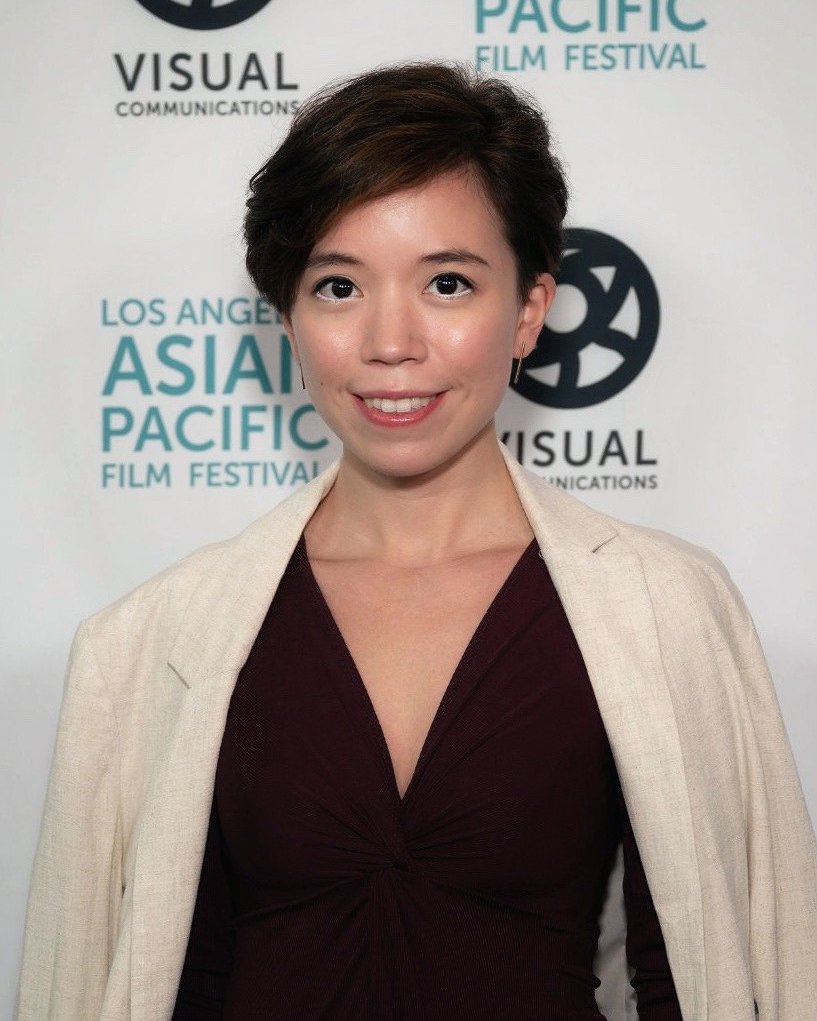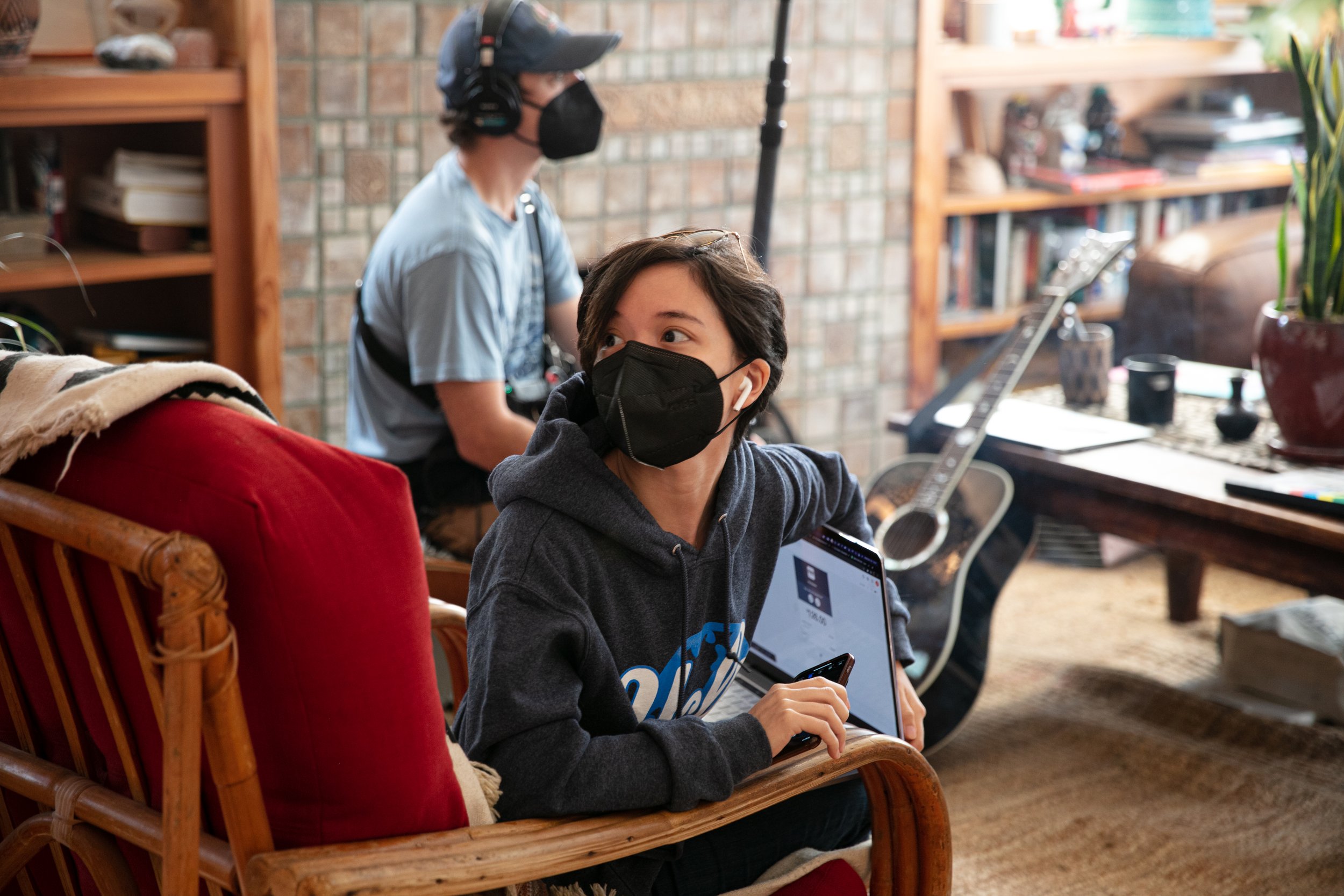Producer Selena Leoni Speaks From Experience
Mixed Asian Media - February 9, 2023
By Jaime Schwarz
Selena Leoni is a Los Angeles based producer whose films were featured at MAM Fest 2022, where her feature Smile or Hug won best feature. While she’s mixed-race (Italian and Chinese), she’s mixed internationally as well and has an interesting perspective having grown up in different countries before coming to the United States. We deep dive into her experiences with representation and her open-minded attitude.
Interview
Do you mind sharing a little bit about yourself?
I was born in Italy, and I was there up until I was 7. My mom and my dad split, and I did school in China, but would go back to Italy for holidays. But not Christmas. I was just talking about the Lunar New Year with a friend, because in China, they don't have a Christmas holiday, but I had the Chinese New Year holiday, which is like a whole month, and I would go back to Italy. So I didn't really have that much experience with the Chinese new year. When people ask me, “What do you do at Chinese New Year?” I’m like, “I don't know. I go back to Italy.”
Do you identify more with one culture?
In a way. I was always treated as Italian when I was in China and then treated as Chinese when I was in Italy. I don't feel like both, but I also feel like both.
What do you prefer to eat here? American, Italian, or American Chinese?
American Chinese, because when I was in Italy growing up, I used to eat Italian Chinese. It's like Panda Express where it's not real Chinese food, it’s like orange chicken or something, but they do the same in Italy. So it tastes kind of like the American version, but a little bit less salty. I'm very critical of American Italian food because I grew up eating very authentic Italian food. That was a big shift for me. For example, I’ll see American pizza and I'm like, that's not real pizza.
Have you been to New York?
I remember going to Little Italy and Chinatown. It was two streets next to each other, and I was like, “Oh that's like me.”
Have you noticed if/how they treat other people or mixed-race people differently in Italy and China? Racism?
When I was growing up, there weren't that many mixed-race kids. My mom was the only Chinese in town in Italy at the time, so when I was a kid, I didn't really feel much difference, because I think kids don't really see the difference until they’re influenced by society. Before like 5 or 4, I never felt different. When I moved and started to go back and forth, kids noticed I was different, and that’s when I noticed.
It's not that I experienced racism, but when I was in China, I was very popular among the teachers because they like white culture. So sometimes a teacher would treat me differently because I was mixed and looked different, like I had curly hair. My peers didn't like that.
I remember when I was a kid in Italy, we went to the beach with my friend and there was this Chinese street vendor that did temporary tattoos for kids. My mom speaks to the vendor in Chinese, and I think she was able to get a good discount or something. My friend was like, “You only got this because you're Chinese.” They said stuff that points out you're different.
As far as racism goes, I remember in Italian culture, there's, like, a way of describing Asian people because of the eyes. They would physically move their eyes up and mimic. I did not notice that was racist when I was growing up.
That would get you canceled here in America if there's a photo of someone doing that.
Yes. There's also a cultural difference. In Italy, people do that and it's not them being racist, they just are really trying to describe people. But then when I moved here, I have a friend who did that, and everyone was shocked. He was mimicking someone else, so it wasn't really about me, but I was the only Asian in the group and everyone looked at me, and I was like, “Why are you guys shocked?” He probably did it without even knowing it, ‘cause that's how he grew up too. It’s still problematic. But it’s interesting how I’m treated differently in places.
Did you feel like you had to code switch going back and forth?
Yeah. When I first moved to China, I didn't know any Chinese. So my mom would tell me to call her friends “auntie” in Chinese. After a while I looked at her and said, “Mom, why are all the females here called auntie?” In China, someone who is older is an “auntie,” but in Italy, we just call everyone their name. I’d talk about my Chinese cousin in Italy and say, “He's my brother.” Because in Chinese you don’t say cousin, there’s no word, so you just say “brother.” But when I went back to Italy, I would be like, “My brother, blah, blah,” and then after a few years, one of the family friends was like, “How is your mom? I heard she had another kid?” I was like, “What?” [It was] because I kept saying “My brother was doing this, my brother was doing that”.
That's hilarious. I think in America we think of being mixed race as just racial, but you can be mixed environmentally as well, internationally. You grew up in two different cultures.
There's a whole idea of American mixed race kids, and I felt completely different from their experience because I didn't grow up in America. Being mixed race here, they target whatever the non-white side is. I noticed that the moment I moved here. Like people will be like, “You're Asian.” They will not see the half white of me.
When I first moved here, they were like, “Oh she's Asian.” I’d say, “No, I'm mixed.” Because I don't feel a hundred percent of either. I wouldn't say I'm Italian or I'm Chinese. I say that I'm Italian and Chinese. Because I’m both. Growing up in China, people didn’t really treat me as Asian, because they saw the white. It was an adjustment for me to embrace my Chinese identity because people expect it more in a way here.
Selena Leoni on the set of Smile or Hug
You're interested in telling globalized character-driven stories. How has your experience influenced you in wanting to tell those stories?
Growing up I didn't really see myself on the screen. I was very curious about different cultures because from moving so much, I saw how big the world is and how the place that you grow up influences who you are and how you behave. I noticed that I tend to be more forgiving of people. Some people get very angry when people say something inappropriate or when people make comments that are maybe a little bit racist. I think because I grew up moving between two countries, I see it a little bit differently. My Italian grandma would be like, “Are there tomatoes in China?” She grew up in this little town in Italy, and she never moved. Like, she doesn't know anything outside this little city. The same with my Chinese grandparents. So they will make comments like that, and I’m more forgiving because I try to understand from their perspective.
I feel like it's important for people to know about other cultures and in order to understand each other more instead of just criticizing. If you create globalized stories that go everywhere, then people, like my grandparents, will have the chance to watch and know more about another culture, instead of just the little thing that they're shown locally.
It makes you more open-minded ‘cause you're exposed. If you don't have the privilege of travel, then movies are the closest thing you get to learning about other worlds.
I think now it's a little bit better with, like, Netflix and globalization. In Italy they watch a lot of American drama, that's a good thing. People have started to learn about each other instead of just completely blacking it out and not even wanting to know.
Has it been difficult navigating the entertainment industry as an international woman?
Yeah. It’s hard because you don't know anyone when you move here, so you have to build up relationships. Then because of language, sometimes people will treat you differently. I didn't notice that, but one of my friends pointed it out. He said, “You are very intelligent. You're good producer. But I feel like sometimes other people treat you differently because you're a foreigner and you don't have perfect English.”
So now I’m going to practice more, not because I want to blend in, but because you can't control how other people perceive you. Sometimes you just have to practice and find a way to make other people see you too.
I saw both your films, and they both were about being mixed in a way. Do you feel like you're drawn to projects that talk about the mixed experience?
A hundred percent. In both those projects, we didn't purposely do that, but it just happened to be two movies with a lot of mixed-race actors and characters. It was very fun to shoot because you learn about each other's experience and you realize you have so much in common.
Do you have any advice you wanna share with other mixed-race kids entering the field?
I think it's important to recognize who you are. I know it's hard. I mean, even for me, I'm still trying to figure out my identity, but sometimes you have to embrace both of your identities in order to learn who you are. When I was growing up, there was one point when I was, like, purely trying to fit in the Chinese culture. Then there was also a point in my life where I tried to be more Italian, because, when I was in Hong Kong for example, I saw all the things that you get from more Western culture. Now I'm just like, actually try to embrace yourself and embrace all the cultures.
For people who are joining the industry, tell your story. Everyone has a different experience, and honestly, you can never see yourself being represented on the screen, unless you tell your own story. So the only thing we can do is to increase more and add more to have representation. So that people, like children, can see. For example, in Grey’s Anatomy, when Callie Torres discovered that she's bisexual and likes women, I had never seen that on screen. I was like, “That's something that I can relate to.” And she was older, in her 30s, I think. I had never seen that and the idea that sometimes it takes so long to discover who you are.
I love that. I think that's a great thing to end on, so thank you.
End of Interview
You can learn more about Selena on her website: selenaleoni.com
Jaime Schwarz, the daughter of a Jewish father and a Korean mother, is an actor, singer, and writer based in both NYC and LA. She has worked Off-Broadway and in television, appearing in shows like Difficult People, Younger, Jane the Virgin, and Sorry for Your Loss with Elizabeth Olsen. In addition to acting, Jaime is writing several projects, one of which is a story about being the child of a mixed race family, and has written, starred in, and produced a short film called “On a Scale.” Along with storytelling and the arts, she’s passionate about social justice, with a personal interest in women’s and immigration rights, mixed race advocacy, and men having a skincare regimen. Instagram: @jaime.jpeg_ Twitter:@jaime_schwarz




